- Home
- Christopher Paolini
Inheritance i-4 Page 31
Inheritance i-4 Read online
Page 31
Eragon’s alarm increased as the young man pulled a dagger from within his robes. “There’s nothing else I can do,” he said, almost as if he were speaking to himself. “Nothing else …” He sniffed and moved toward Eragon. “It’s for the best.”
As the young man stepped forward, Eragon wrenched at his bonds, trying to pull one of his hands out of the manacles. The iron cuffs were too tight, however, and all he succeeded in doing was scraping more of the skin off his wrists.
“I’m sorry,” whispered the young man as he stopped in front of Eragon and drew back the dagger.
No! Eragon shouted in his mind.
A chunk of glittering amethyst hurtled out of the tunnel that had brought Eragon and Arya to the chamber. It struck the novitiate in the back of the head, and he fell against Eragon. Eragon flinched as he felt the edge of the dagger slide across his ribs. Then the young man tumbled to the floor and lay there, unconscious.
From within the depths of the tunnel emerged a small, limping figure. Eragon stared, and as the figure moved into the light, he saw that it was none other than Solembum.
Relief swept through Eragon.
The werecat was in his human form, and he was naked except for a ragged loincloth that looked as if it had been torn from the clothes of their attackers. His spiky black hair stood nearly on end, and a feral snarl disfigured his lips. Several cuts covered his forearms, his left ear hung drooping from the side of his head, and a strip of skin was missing from his scalp. He carried a blood-smeared knife.
And following a few paces behind the werecat was the herbalist, Angela.
INFIDELS ON THE LOOSE
“What an idiot,” proclaimed Angela as she hurried to the edge of the patterned disk on the floor. She was bleeding from a number of cuts and scratches, and her clothes were stained with even more blood, which Eragon suspected was not her own. Otherwise, she appeared unharmed. “All he had to do was-this!”
And she swung her sword with its transparent blade up and over her head, and brought the pommel down against one of the amethysts that ringed the disk. The crystal shattered with an odd snap, like a shock of static, and the light it emitted flickered and went out. The other crystals maintained their radiance.
Without pause, Angela stepped to the next piece of amethyst and broke it as well, then the one after it, and so on.
Never in his life had Eragon been so grateful to see anyone.
He alternated between watching the herbalist and watching the cracks widening at the top of the first egg. The Ra’zac had almost pecked its way out, a fact it seemed to be aware of, for it was squeaking and tapping with increased vigor. Between the pieces of shell, Eragon saw a thick white membrane and the beaked head of the Ra’zac pushing blindly against it, horrible and monstrous.
Hurry, hurry, Eragon thought as a fragment as large as his hand fell from the egg and clattered against the floor, like a plate made of fired clay.
The membrane tore, and the young Ra’zac stuck its head out of the egg, revealing its barbed purple tongue as it uttered a triumphant screech. Slime dripped from its carapace, and a fungus-like smell pervaded the chamber.
Eragon tugged at his bonds once more, futile as it was.
The Ra’zac screeched again, then struggled to extricate itself from the remainder of the egg. It pulled one clawed arm free, but in the process it unbalanced the egg, which tipped to one side, spilling a thick, yellowish fluid across the patterned disk. The grotesque hatchling lay on its side for a moment, stunned. Then it stirred and got to its feet, where it stood, swaying and uncertain, clicking to itself like an agitated insect.
Eragon stared, appalled and terrified, but also fascinated.
The Ra’zac had a deep, ridged chest that made it look as if its ribs were on the outside of its body, not the inside. The creature’s limbs were thin and knobby, like sticks, and its waist was narrower than any human’s. Each leg had an extra backward-bending joint, something that Eragon had never seen before, but which accounted for the Ra’zac’s unsettling gait. Its carapace appeared soft and malleable, unlike those of the more mature Ra’zac Eragon had encountered. No doubt it would harden in time.
The Ra’zac tilted its head-its huge, protruding, pupil-less eyes catching the light-and it chittered as if it had just discovered something exciting. Then it took a tentative step toward Arya … and another … and then another, its beak parting as it strained toward the pool of blood by her feet.
Eragon shouted into his gag, hoping to distract the creature, but other than a quick glance, it ignored him.
“Now!” exclaimed Angela, and she broke the last of the crystals.
Even as the shards of amethyst skittered across the floor, Solembum leaped toward the Ra’zac. The werecat’s form blurred in midair-head shrinking, legs shortening, fur sprouting-and he landed on all fours, his body once more that of an animal.
The Ra’zac hissed and clawed at Solembum, but the werecat dodged the blow and, faster than the eye could follow, slapped the Ra’zac’s head with one of his large, heavy paws.
The Ra’zac’s neck broke with a crack, and the creature flew across the room and landed in a twisted heap, where it lay twitching for several seconds.
Solembum hissed, his one uninjured ear pressed flat against his skull; then he wriggled out of the loincloth that was still tied around his hips and went over to sit and wait by the other egg.
“What have you done to yourself?” said Angela as she hurried over to Arya. Arya wearily lifted her head, but she made no attempt to answer.
With three swift strokes of her colorless blade, the herbalist sliced through Arya’s remaining cuffs, as if the tempered metal were no harder than cheese.
Arya fell to her knees and doubled over, pressing her injured hand against her stomach. With her other hand, she tore at her gag.
The burning in Eragon’s shoulders eased when Angela cut him free and he was finally able to lower his arms. He pulled the cloth out of his mouth and, in a hoarse voice, said, “We thought you were dead.”
“They’ll have to try harder than that if they want to kill me. Bunglers, the lot of them.”
Still doubled over, Arya began to chant spells of binding and healing. Her words were soft and strained, but she never faltered or misspoke.
While she worked to repair the damage to her hand, Eragon healed the cut on his ribs as well as the sores on his wrists. Then he motioned at Solembum and said, “Move.”
The werecat flicked his tail but did as Eragon asked.
Lifting his right hand, Eragon said, “Brisingr!”
A pillar of blue flame erupted around the second egg. The creature inside screamed: a terrible, unearthly sound, more like the screech of tearing metal than the cry of person or beast.
Narrowing his eyes against the heat, Eragon watched with satisfaction as the egg burned. And let that be the last of them, he thought. When the screaming ceased, he extinguished the flame, and it went out from the bottom up. The silence afterward was unexpectedly complete, for Arya had finished her incantations and all was still.
Angela was the first to stir. She went to Solembum and stood over him, murmuring in the ancient language as she mended his ear and other wounds.
Eragon knelt by Arya and put a hand on her shoulder. She looked up at him, then uncurled her body enough to show him her hand. The skin along the lower third of her thumb, as well as along the outer edge of her palm and across the back of her hand, was shiny and bright red. However, the muscles underneath appeared sound.
“Why didn’t you finish healing it?” he asked. “If you’re too tired, I can-”
She shook her head. “I damaged several nerves … and I can’t seem to repair them. I need Blodhgarm’s help; he is more skilled than I at manipulating flesh.”
“Can you fight?”
“If I’m careful.”
He tightened his grip on her shoulder for a moment. “What you did-”
“I only did what was logical.”
�
�Most people wouldn’t have had the strength.… I tried, but my hand was too big. See?” And he held up his hand against hers.
She nodded, then grasped his arm and slowly got to her feet. Eragon rose with her, providing her with a steady support.
“We have to find our weapons,” he said, “as well as my ring, my belt, and the necklace the dwarves gave me.”
Angela frowned. “Why your belt? Is it enchanted?”
When Eragon hesitated, unsure whether to tell her the truth, Arya said, “You would not know the name of its maker, wise one, but during your travels, you must surely have heard tell of the belt of the twelve stars.”
The herbalist’s eyes widened. “That belt?! But I thought it was lost over four centuries ago, destroyed during the-”
“We recovered it,” said Arya flatly.
Eragon could see that the herbalist longed to ask more questions, but she merely said, “I see.… We can’t waste time searching every room in this warren, though. Once the priests realize you’ve escaped, we’ll have the whole pack of them nipping at our heels.”
Eragon motioned toward the novitiate on the floor and said, “Maybe he can tell us where they took our things.”
Dropping into a squat, the herbalist placed two fingers against the youth’s jugular vein, feeling his pulse. Then she slapped his cheeks and peeled back his eyelids.
The novitiate remained slack and motionless.
His lack of response seemed to annoy the herbalist. “One moment,” she said, closing her eyes. A slight frown creased her brow. For a while, she was still; then she sprang upward with sudden speed. “What a self-absorbed little wretch! No wonder his parents sent him to join the priests. I’m surprised they put up with him as long as they did.”
“Does he know anything of use?” asked Eragon.
“Only the path to the surface.” She pointed toward the door to the left of the altar, the same door through which the priests had entered and departed. “It’s amazing that he tried to free you; I suspect it’s the first time in his life he’s ever done anything of his own accord.”
“We have to bring him with us.” Eragon hated to say it, but duty compelled him. “I promised we would if he helped us.”
“He tried to kill you!”
“I gave my word.”
Angela sighed and rolled her eyes. To Arya, she said, “I don’t suppose you can convince him otherwise?”
Arya shook her head, then hoisted the young man onto her shoulder without apparent effort. “I’ll carry him,” she said.
“In that case,” the herbalist said to Eragon, “you had best have this, since it seems you and I are to do most of the fighting.” She handed him her short sword, then drew a poniard with a jeweled hilt from within the folds of her dress.
“What is it made of?” Eragon asked as he peered through the transparent blade of the sword, noticing how it caught and reflected the light. The substance reminded him of diamond, but he could not imagine that anyone would make a weapon out of a gemstone; the amount of energy required to keep the stone from breaking with every blow would soon exhaust any normal magician.
“Neither stone nor metal,” said the herbalist. “A word of caution, though. You must take great care when handling it. Never touch the edge or allow anything you cherish to come near it, else you will regret it. Likewise, never lean the sword against something you might need-your leg, for example.”
Wary, Eragon held the sword farther away from his body. “Why?”
“Because,” said the herbalist with evident relish, “this is the sharpest blade in all of existence. No other sword or knife or ax can match the keenness of its edge, not even Brisingr. It is the ultimate embodiment of an incision-making instrument. This”-she paused for emphasis-“is the archetype of an inclined plane.… You’ll not find its equal anywhere. It can cut through anything not protected by magic, and many things that are. Try it if you don’t believe me.”
Eragon looked around for something to test the sword against. In the end, he strode over to the altar and swung the blade at one corner of the stone slab.
“Not so quickly!” cried Angela.
The transparent blade passed through four inches of stone as if the granite were no harder than custard, then continued down toward his feet. Eragon yelped and jumped back, barely managing to stop his arm before he cut himself.
The corner of the altar bounced off the step below and then tumbled clacking toward the middle of the room.
The blade of the sword, Eragon realized, might very well be diamond after all. It would not need as much protection as he had assumed, since it would rarely meet with any substantial resistance.
“Here,” said Angela. “You had better have this as well.” She unbuckled the sword’s scabbard and gave it to him. “It’s one of the few things you can’t cut with that blade.”
It took Eragon a moment to find his voice after so nearly lopping off his toes. “Does the sword have a name?”
Angela laughed. “Of course. In the ancient language, its name is Albitr, which means exactly what you think. But I prefer to call it Tinkledeath.”
“Tinkledeath!”
“Yes. Because of the sound the blade makes when you tap it.” She demonstrated with the tip of a fingernail and smiled at the resulting high-pitched note that pierced the darkened chamber like a ray of sunshine. “Now then, shall we be off?”
Eragon checked to make sure they were not forgetting anything; then he nodded, strode to the left-hand door, and opened it as quietly as he could.
Through the doorway was a long, broad hallway lit by torches. And standing guard in two smart rows, one along each side of the hallway, were twenty of the black-garbed warriors who had ambushed them earlier.
They looked at Eragon and reached for their weapons.
A curse ran through Eragon’s mind, and he sprang forward, intending to attack before the warriors could draw their swords and organize themselves into an effective group. He had only covered a few feet, however, when a flicker of movement appeared next to each man: a soft, shadowy blur, like the motion of a windblown pennant seen at the edge of his vision.
Without so much as a single cry, the twenty men stiffened and fell to the floor, dead, every last one of them.
Alarmed, Eragon slowed to a stop before he ran into the bodies. Each of the men had been stabbed through an eye, as neat as could be.
He turned to ask Arya and Angela if they knew what had happened, but the words died in his throat as he beheld the herbalist. She stood braced against a wall, leaning on her knees and panting heavily. Her skin had gone deathly white, and her hands were shaking. Blood dripped from her poniard.
Awe and fear filled Eragon. Whatever the herbalist had done, it was beyond his understanding.
“Wise one,” said Arya, and she too sounded uncertain, “how did you manage to do this?”
The herbalist chuckled between breaths, then said, “I used a trick … I learned from my master … Tenga … ages ago. May a thousand spiders bite his ears and knobbly bits.”
“Yes, but how did you do it?” insisted Eragon. A trick like that might be useful in Uru’baen.
The herbalist chuckled again. “What is time but motion? And what is motion but heat? And are not heat and energy but different names for the same thing?” She pushed herself off the wall, walked over to Eragon, and patted him on the cheek. “When you understand the implications of that, you’ll understand how and what I did.… I won’t be able to use the spell again today, not without hurting myself, so don’t expect me to kill everyone the next time we run into a batch of men.”
With some difficulty, Eragon swallowed his curiosity and nodded.
He stripped a tunic and a padded jerkin off one of the fallen men, and after donning the clothes, he led the way down the hall and through the archway at the far end.
They encountered no one else in the complex of rooms and corridors thereafter, nor did they find any sign of their stolen possessions. Although Erag
on was glad to avoid notice, the absence of even servants worried him. He hoped that he and his companions had not triggered alarms that had warned the priests of their escape.
Unlike the abandoned chambers they had seen before the ambush, those they passed through now were filled with tapestries, furniture, and strange devices made of brass and crystal, the purpose of which Eragon could not fathom. More than once, a desk or a bookcase tempted him to pause and inspect its contents, but he always resisted the urge. They did not have time to read musty old papers, no matter how intriguing.
Angela chose the path they took whenever there was more than one option, but Eragon remained in the lead, clutching the wire-wrapped hilt of Tinkledeath with a grip so hard, his hand began to cramp.
Soon enough, they arrived at a passageway ending in a flight of stone steps that narrowed as it rose. Two novitiates stood by the stairs, one on either side, each holding a rack of bells such as Eragon had seen earlier.
He ran at the two young men and managed to stab one novitiate through the neck before he could shout or ring his bells. The other, however, had time to do both before Solembum leaped on him and bore him to the ground, tearing at his face, and the whole of the passageway rang with the clamor.
“Hurry!” Eragon cried as he bounded up the stairs.
At the top of the steps was a freestanding wall some ten feet wide, covered with ornate scrollwork and carvings that seemed vaguely familiar to Eragon. He dodged around the wall and came out into a beam of rose-tinted light of such intensity that he faltered, confused. He lifted Tinkledeath’s scabbard to shade his eyes.
Not five feet in front of him, the High Priest sat on its bier, blood dripping from a cut on its shoulder. Another of the priests-a woman missing both her hands-sat kneeling by the side of the bier, catching the fall of blood in a golden chalice that she held clamped between her forearms. Both she and the High Priest stared at Eragon with astonishment.
Then Eragon looked past them and saw, as if in a series of lightning flashes: Massive ribbed columns rising toward a vaulted ceiling that vanished into shadow. Stained-glass windows set within towering walls-the windows on the left burning with light from the rising sun; those on the right dull and flat, lifeless. Pale statues standing between the windows. Rows of granite pews, dappled with different colors, extending all the way to the far-off entrance to the nave. And, filling the first four rows, a flock of leather-garbed priests, their faces upturned and their mouths opened in song, like so many hatchlings begging for food.

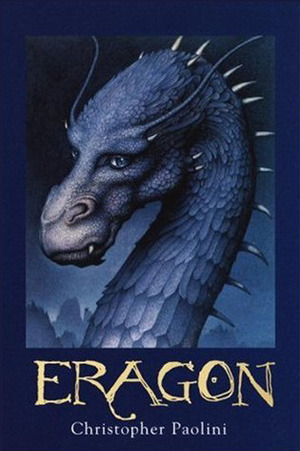 Eragon
Eragon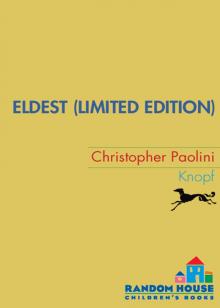 Eldest
Eldest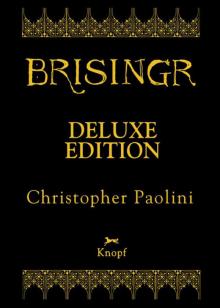 Brisingr
Brisingr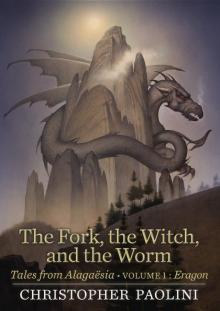 The Fork, the Witch, and the Worm
The Fork, the Witch, and the Worm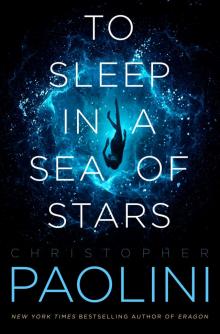 To Sleep in a Sea of Stars
To Sleep in a Sea of Stars![Eldest [en] i-2 Read online](http://i1.bookreadfree.com/i/03/19/eldest_en_i-2_preview.jpg) Eldest [en] i-2
Eldest [en] i-2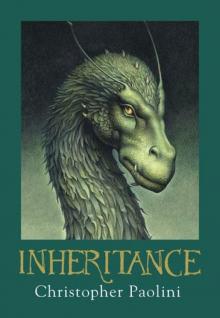 Inheritance i-4
Inheritance i-4![Brisingr [en] i-3 Read online](http://i1.bookreadfree.com/i1/03/31/brisingr_en_i-3_preview.jpg) Brisingr [en] i-3
Brisingr [en] i-3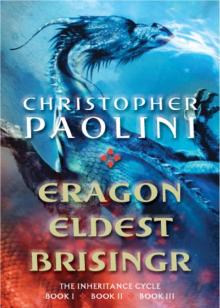 Inheritance Cycle Omnibus
Inheritance Cycle Omnibus